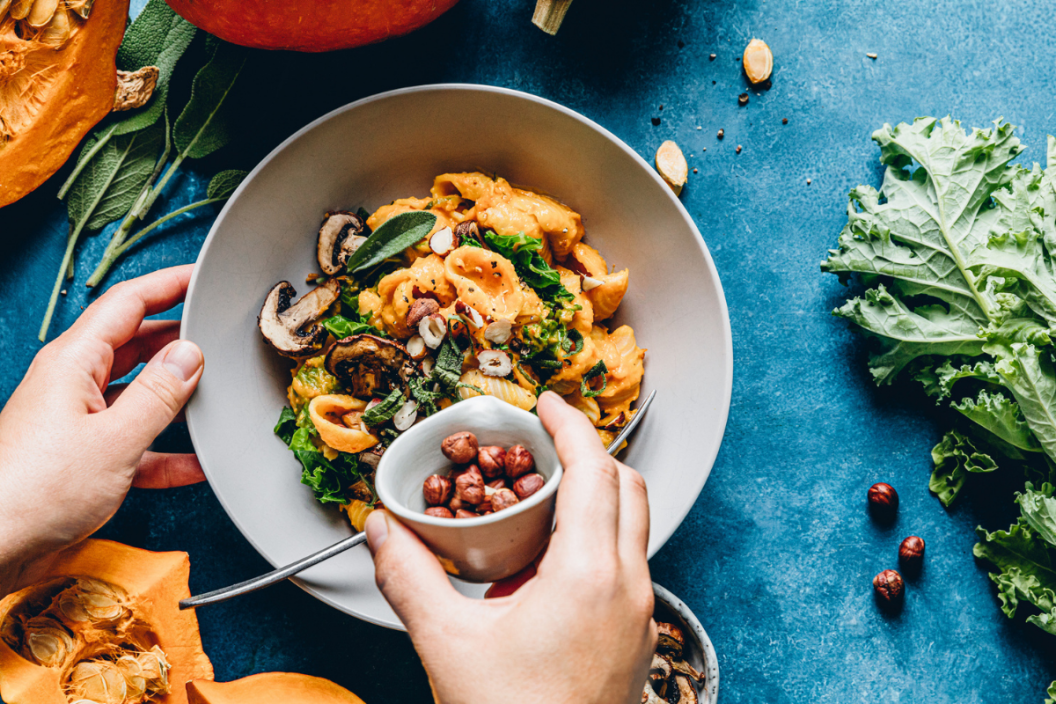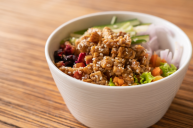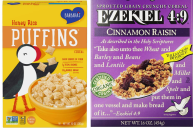When it comes to a vegan diet, the first concern is always whether one can get enough protein without eating animal products. Most people consider a burger or steak to be the meal to eat when in need of a healthy helping of protein after a workout. However, vegans choose not to consume animal products for a number of reasons, whether it's health, the environment, or animal rights, meaning that they can't simply buy a hamburger when they're craving protein. The question is, can you really enough protein as a vegan?
How Much Protein Should You Be Eating?
https://www.instagram.com/p/CWn8X13q2QR/
Whether you're looking to build muscle or simply ensure that your diet is well-balanced, protein intake is one of the most important considerations. The first question is, how much protein does one actually need?
The daily protein recommendation for an average adult male is around 56 grams a day. For an adult woman, the recommendation is 46 grams, and a pregnant or breastfeeding woman should be consuming 71 grams a day.
To determine whether a vegan can actually get enough protein from a dairy-free, meat-free diet, we've compiled a list of protein sources, with the amount of protein each one contains.
Protein Content in Meat Products
For all the meat-eaters out there, here are some common meat products and an approximate protein content of each:
- 1 cup of bacon- 72 grams of protein
- 1 cup of beef (ground, lean)- 56 grams of protein
- 1 cup of chicken breast tenders (cooked)- 33.4 grams of protein
- 1 cup of cod (Atlantic)- 50.6 grams of protein
- 1 cup of haddock (smoked)- 56 grams of protein
- 1 cup of ham (meat only, roasted)- 56 grams of protein
- 1 cup of pork (ground)- 58.66 grams of protein
- 1 cup of salmon (Atlantic)- 58.66 grams of protein
- 1 cup of shrimp (fresh)- 32 grams of protein
- 1 cup of tuna (canned, light)- 45.33 grams of protein
- 1 cup of turkey (light meat)- 66.66 grams of protein
- 1 cup of turkey (ground)- 61.33 grams of protein
Although there's definitely a range, 1 cup of most of these meat products will give an adult the amount of protein they need in a day. Whether you're eating chicken and rice for dinner or ground beef tacos, you're probably good to go on protein intake.
Protein Content in Vegan Proteins
Looking on the vegan side of things, here are some of the best vegan protein sources and how much protein is provided by each:
- 1 cup of Beyond Meat meatless crumbles- 28 grams of protein
- 1 cup of seitan- 63 grams of protein
- 1 cup of lentils- 18 grams of protein
- 1 cup of tofu- 22.4 grams of protein
- 1 cup of tempeh- 41.6 grams of protein
- 1 cup of edamame- 16.9 grams of protein
- 1 cup of chickpeas- 11.8 grams of protein
- 1 cup of hemp seeds- 50.5 grams of protein
- 1 cup of almonds- 28 grams of protein
- ?1 cup of peanut butter- 65 grams of protein
- ?1 cup of quinoa- 8-9 grams of protein
- ?1 cup of wild rice- 7 grams of protein
When delving into the world of veganism, you quickly realize that there is an endless number of vegan protein sources, far beyond the most well-known options like tofu and beans. From protein-packed veggies to soy milk to chia seeds, there are many ways to get the amount of protein your body needs.
There's also a range of protein amounts in plant protein products, so you can get more or less protein content depending on what you choose. While they're generally less high protein than the average meat product, you can still easily get to the daily recommendation for protein in a day.
For example, if you have a brown rice bowl containing a cup of rice and a cup of tofu, that's already about 30 grams of protein. Eat a protein bar, vegan protein shake, or smoothie with some chia seeds, nut butter, vegan protein powder, and pumpkin seeds, and you're easily around 50 for the day.
So Can You Get Enough Protein As a Vegan?
Based on this, it is possible to get enough protein content with a vegan diet! The most important thing is to do research on the amount of protein in your meals, to ensure that you're getting around your daily recommendation. It's also good to incorporate a source of protein in multiple meals, which gives more energy throughout the day and makes it easier to reach the protein your body needs.
Plus, many vegan proteins have health benefits that aren't present in animal products. For example, lentils are a great source of protein and also help to reduce the chance of heart disease, excess body weight, and certain types of cancer. Soybean products like tofu and tempeh are generally a good source of essential amino acids, along with containing high amounts of calcium, vitamin B12, and iron.
The bottom line is, you can totally be vegan and get enough protein as long as you're mindful of protein intake!




